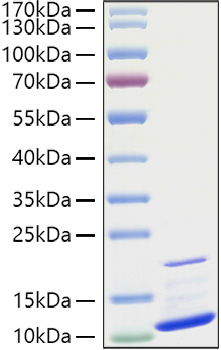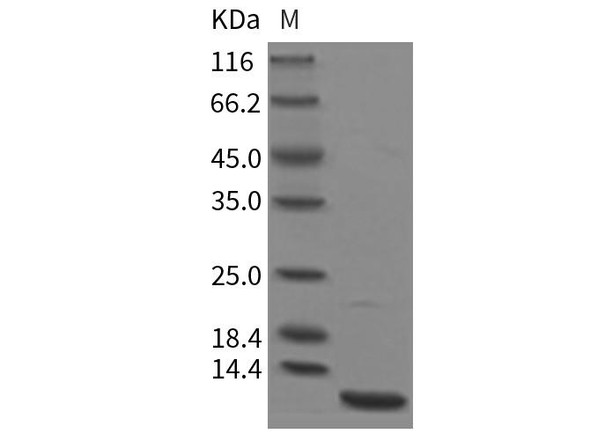Description
Recombinant Human CXCL3/GRO-gamma/MIP2-beta Protein
The Recombinant Human CXCL3/GRO-gamma/MIP2-beta Protein is a biologically active recombinant protein that plays a significant role in various cellular processes and signaling pathways in human biology. This protein is widely employed in immunological research, cell biology studies, protein-protein interaction analyses, and therapeutic development, providing researchers with a reliable tool for investigating CXCL3/GRO-gamma/MIP2-beta function and its implications in health and disease.
This product (SKU: RPCB0979) is produced using E. coli and features a No tag tag for convenient detection and purification. The protein exhibits a calculated molecular weight of 7.87 kDa with an observed molecular weight of 11-12 kDa under denaturing conditions, achieving ≥ 85 % as determined by SDS-PAGE., ensuring exceptional quality and consistency for research applications.
Key Features
| High Purity by Affinity Chromatography | |
| Mammalian & Bacterial Expression Systems | |
| High lot-to-lot consistency via strict QC |
| Product Name: | Recombinant Human CXCL3/GRO-gamma/MIP2-beta Protein |
| SKU: | RPCB0979 |
| Size: | 10 μg , 20 μg , 50 μg , 100 μg |
| Reactivity: | Human |
| Synonyms: | CXCL3, CINC-2b, GRO3, GROg, MIP-2b, MIP2B, SCYB3 |
| Tag: | No tag |
| Expression Host: | E. coli |
| Calculated MW: | 7.87 kDa |
| Observed MW: | 11-12 kDa |
| Gene ID: | 2921 |
| Protein Description: | High quality, high purity and low endotoxin recombinant Recombinant Human CXCL3/GRO-gamma/MIP2-beta Protein (RPCB0979), tested reactivity in E. coli and has been validated in SDS-PAGE.100% guaranteed. |
| Endotoxin: | < 1 EU/μg of the protein by LAL method. |
| Purity: | ≥ 85 % as determined by SDS-PAGE. |
| Formulation: | Lyophilized from a 0.22 μm filtered solution of PBS, pH 7.4. |
| Reconstitution: | Centrifuge the vial before opening. Reconstitute to a concentration of 0.1-0.5 mg/mL in sterile distilled water. Avoid vortex or vigorously pipetting the protein. For long term storage, it is recommended to add a carrier protein or stablizer (e.g. 0.1% BSA, 5% HSA, 10% FBS or 5% Trehalose), and aliquot the reconstituted protein solution to minimize free-thaw cycles. |
| Storage: | Store at -20℃.Store the lyophilized protein at -20℃ to -80 ℃ up to 1 year from the date of receipt. After reconstitution, the protein solution is stable at -20℃ for 3 months, at 2-8℃ for up to 1 week. |
CXCL3 is involved in migration, invasion, proliferation and tubule formation of trophoblasts and may play a key role in the pathogenesis of preeclampsia. CXCL3 autocrine/paracrine pathways are involved in the development of prostate cancer by regulating the expression of the target genes that are related to the progression of malignancies. CXCL3 is a novel adipokine that facilitates adipogenesis in an autocrine and/or a paracrine manner through induction of c/ebpb and c/ebpd. CXCL3 and its receptor CXCR2 are overexpressed in prostate cancer cells, prostate epithelial cells and prostate cancer tissues, which may play multiple roles in prostate cancer progression and metastasis.







